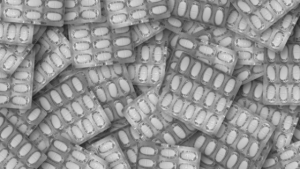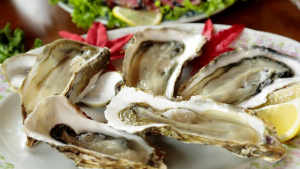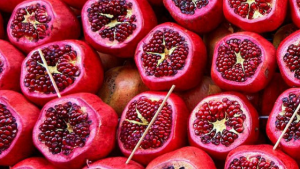
Most medications come with several side effects, ranging from mild dry mouth to severe life-threatening diseases. For most men, some of the worst—and the most common—are adverse sexual effects.
Some sexual side effects of medications can include erectile dysfunction, impotence, low testosterone, and even low sperm count or infertility. This is because certain medications impact hormone levels, nerve function, and blood circulation, all of which are an important part of sexual health.
Erectile dysfunction (ED) is typically not a disease in its own right. Instead, it is usually a symptom or side effect of another underlying condition, like high blood pressure or type 2 diabetes, which is why most men with erectile dysfunction are also on prescription medications to treat these conditions.
Erectile dysfunction has been linked as a side effect of numerous diseases along with the medications that treat those diseases.

What medications can cause erectile dysfunction and other sexual dysfunction?
What can you do to treat both your condition and your erectile dysfunction in a healthy way?
1. Blood pressure medications
Use
Blood pressure medications are used to treat high blood pressure. High blood pressure can be a serious condition as it damages blood vessels and causes arteries to harden and narrow. This can limit blood flow throughout the body, including to the heart (heart disease) and penis (erectile dysfunction).
Men with high blood pressure often have ED because the blood can’t properly flow to the veins in the penis.

Impact
Men with erectile dysfunction are 38% more likely to have high blood pressure than those without erectile dysfunction; the reverse is also true. There is a direct link between blood pressure and sexual function.
Healthy blood pressure is necessary for an erection. In order to achieve an erection, blood needs to flow into the penis to make it “hard.” If the blood pressure is too high, the arteries in and around the penis become narrowed and damaged, which prevent blood from filling up inside the penis.
Diuretics, a type of blood pressure medication, interfere with blood flow to the sex organs. They also increase the body’s excretion of zinc. Men need zinc in order to produce testosterone and diuretics can decrease the body’s concentrations of free-floating zinc.
Beta-blockers are blood pressure medications that interfere with nerve impulses. This means that the brain-penis connection is severed making sexual arousal nearly impossible. Beta-blockers also reduce testosterone levels, which lowers libido and sexual interest.
There is also an indirect link between blood pressure medications and lifestyle. Lifestyle factors like eating unhealthy foods, not exercising, and smoking can cause men to take medication for high blood pressure which may also lead to sexual dysfunction. This is also directly linked to chronic inflammation in the body, which is at the heart of nearly all major diseases.
Types
- Atenolol (Tenormin)
- Bethanidine
- Bumetanide (Bumex)
- Captopril (Capoten)
- Chlorothiazide (Diuril)
- Chlorthalidone (Hygroton)
- Clonidine (Catapres)
- Enalapril (Vasotec)
- Furosemide (Lasix)
- Guanabenz (Wytensin)
- Guanethidine (Ismelin)
- Guanfacine (Tenex)
- Haloperidol (Haldol)
- Hydralazine (Apresoline)
- Hydrochlorothiazide (Esidrix)
- Labetalol (Normodyne)
- Nethyldopa (Aldomet)
- Metoprolol (Lopressor)
- Nifedipine (Adalat, Procardia)
- Phenoxybenzamine (Dibenzyline)
- Phentolamine (Regitine)
- Prazosin (Minipress)
- Propranolol (Inderal)
- Reserpine (Serpasil)
- Spironolactone (Aldactone)
- Triamterene (Maxzide)
- Verapamil (Calan)
Note that some blood pressure meds have more side effects than others. The medications that are least likely to cause adverse sexual effects are ACE inhibitors, calcium channel blockers, and angiotensin II receptor blockers. Talk to your doctor about switching your blood pressure medication if you’re experiencing any form of sexual dysfunction.
2. Antihistamine
Use
Antihistamines are most commonly used to treat allergies. You’ve likely taken Benadryl if you got a bad bug bite or Claritin or Zyrtec for the springtime sniffles. Antihistamines are also used to manage nausea, relax muscles, and induce sleep.
Impact
Experts don’t know exactly how antihistamines impact the sexual system, but it may be due to their impact on the nervous system. Antihistamines are used to reduce the body’s natural response to foreign bodies. 
When you have an allergic reaction to something—like pollen or a bee sting—your body releases a surge of histamines and white blood cells to “fight off” that unknown object. Antihistamines minimize this response, which often reduces the redness and itchiness in your system. But it can also depress your body’s natural immune response.
Histamines are used as a transmitter in the brain and spine, so suppressing this transmission may impact the brain’s ability to send signals to the penis to gain an erection.
Studies have also shown that histamines actually play an important role in erections. Histamines activate the H2 and H3 receptors, which help signal the penis to have an erection.
Types
- Cimetidine (Tagamet)
- Cyclobenzaprine (Flexeril)
- Dimenhydrinate (Dramamine)
- Diphenhydramine (Benadryl)
- Doxylamine (Unisom)
- Hydroxyzine (Vistaril)
- Meclizine (Antivert)
- Nizatidine (Axid)
- Promethazine (Phenergan)
- Pseudoephedrine (Sudafed)
- Ranitidine (Zantac)
3. H2 blockers
Use
H2 blockers, also called histamine H2-receptor antagonists, are used to treat gastrointestinal disorders. Common uses include treatment of GERD, gastric ulcers, peptic ulcers, heartburn, and esophagitis.
Impact
Like antihistamines, H2 blockers deactivate the H2 receptors that are necessary for an erection.
Research has found that they may cause impotence and male breast enlargement if taken at high doses for a long period of time. This is likely because they impact the endocrine system and interrupt the H2 signaling process (as discussed above with antihistamines).
Types
- Famotidine (Pepcid)
- Cimetidine (Tagamet)
- Nizatidine (Axid)
- Ranitidine (Zantac)
4. Antidepressants
Use
Antidepressants are prescription drugs used to treat depression, anxiety disorders, eating disorders, and obsessive compulsive disorder. Some doctors prescribe antidepressants as a means of smoking cessation. Low doses of antidepressant medications have also been used to treat chronic pain, menstrual cramps, and irritable bowel syndrome.
Impact
Antidepressants influence the function of neurotransmitters and hormones in the brain, including serotonin, norepinephrine, and dopamine. Serotonin and dopamine are the “happy” hormones, but they also play an important role in libido and sexual satisfaction.
Antidepressants suppress these hormones, which in turn suppresses the body’s ability to get “excited” by sexual stimuli.
These hormones are also used as signals between nerve cells. With minimized signals, the brain has trouble alerting the nerves in the penis. This means that the penis doesn’t know it needs to have an erection. Even stimulating the nerve endings on the penis wouldn’t be able to signal the brain that it’s time to have sex. This inability for the brain and penis to interact is a direct cause of erectile dysfunction.

Overall, studies have shown that antidepressants—especially SSRIs—cause decreased sexual desire and excitement, diminished or delayed orgasm, and erectile dysfunction. There are also some cases of painful ejaculation, penile numbness, and spontaneous erection.
This proves that antidepressants have a direct influence on sexual function—even if the reason is still unclear.
It’s important to note that sexual dysfunction is often psychological. Depression and anxiety are known causes of erectile dysfunction. Thus, men on antidepressants may still have that psychological roadblock that is causing their erectile dysfunction, even while on medication.
One study found that sexual side effects were actually worse when patients did not adhere to their depressive disorders. This suggests that for some individuals, depression and anxiety are a greater cause of sexual dysfunction than the antidepressants themselves.
Note: The same effect occurs with antipsychotic medications.
Types
- Amitriptyline (Elavil)
- Amoxapine (Asendin)
- Buspirone (Buspar)
- Chlordiazepoxide (Librium)
- Chlorpromazine (Thorazine)
- Clomipramine (Anafranil)
- Clorazepate (Tranxene)
- Desipramine (Norpramin)
- Diazepam (Valium)
- Doxepin (Sinequan)
- Fluoxetine (Proxac)
- Fluphenazine (Prolixin)
- Imipramine (Tofranil)
- Isocarboxazid 9Marplan)
- Lorazepam (Ativan)
- Meprobamate (Equanil)
- Mesoridazine (Serentil)
- Nortriptyline (Pamelor)
- Oxazepam (Serax)
- Phenelzine (Nardil)
- Phenytoin (Dilantin)
- Sertraline (Zoloft)
- Thioridazine (Mellaril)
- Thiothixene (Navene)
- Tranylcypromine (Parnate)
- Trifluoperazine (Stelazine)
5. Statins/fibrates
Use
Statins and fibrates are used to treat high cholesterol. They’re often used in conjunction to help lower cholesterol, especially for patients with type 2 diabetes.

Impact
Statins and fibrates are medications that inhibit the production of cholesterol, which happens to be the building block of testosterone and other hormones.
Statins are known to cause rhabdomyolysis, which breaks down muscle tissue and releases protein into the bloodstream, which can impact blood flow and sexual function.
One study found that statins and fibrates, which lower lipids, were significantly related to the incidence of erectile dysfunction cases.
Types
- Fenofibrate (Tricor, Fibricor, Lofibra)
- Gemfibrozil (Lopid)
- Pravastatin (Pravachol)
- Simvastatin (Zocor)
- Lovastatin (Mevacor, Altoprev)
6. Benzodiazepines & anticonvulsants
Use
Also known as tranquilizers, benzodiazepines are used to treat anxiety, insomnia, agitation, muscle spasms, and are sometimes used to prevent seizures.
Anticonvulsants are drugs specifically used to control seizures for those with epilepsy. They may also treat certain types of chronic pain like migraines or neuropathic pain.
Impact
Both benzodiazepines and anticonvulsants have muscle-relaxant properties, which lessen sexual interest and sensation. They also interfere with the production of testosterone, often leading to low T levels, which impact one’s sex drive, as well as, the ability to have orgasms.
Some research suggests that newer anticonvulsants, like gabapentin and topiramate may have fewer side effects.

Types
- Xanax
- Ativan
- Valium
- Librium
- Gabapentin (Neurontin)
- Topiramate (Topamax)
7. Recreational drugs
Use
Recreational drugs are used for recreational purposes… I do not recommend the use of recreational drugs.
Impact
Most recreational drugs (and alcohol) decrease the arousal response to stimuli in the brain, which removes the mental part of getting an erection. If your brain doesn’t respond to the idea or arousal of sex, then it isn’t able to send signals to the penis to have an erection. Painkillers like morphine, oxycodone, and codeine also have similar effects.
Moreover, recreational drugs impact your genetic expression. They can cause methylation on key DNA groups, which can “turn off” healthy genes that stop disease progression and “turn on” unhealthy genes that unleash genetic disorders. Learn more about the epigenetics of drugs here.
Types
- Amphetamines
- Barbiturates
- Cocaine
- Marijuana
- Heroin
- Nicotine
How to stop sexual side effects?
The good news is that most of these adverse sexual side effects are reversible after you stop taking the medication. If you’re suffering from impotence, low libido, infertility, or other sexual dysfunction, you’ll want to talk to your doctor about possibly changing your prescription or approaching your condition with a more natural remedy.

But isn’t taking a medication for your heart more important than a healthy sex life?
Actually, no. A healthy sex drive is a predictor for overall health. Your sex organs are one of the first to stop working when your body is going through some sort of “shock,” like disease or infection. Your essential organs start taking all of the blood and nutrients, so none is left for your sex organs.
Thus, if you have a healthy sex life, it’s likely that your other organs are working in tip-top shape.
Plus, sex is a great method of exercise. It can help burn calories, clear out your arteries, build muscle, boost the immune system and keep your body in shape to ward off disease.
Don’t settle.
There are a number of ways to try to improve your health condition before resorting to heavy medications or therapies. For instance, if you’re currently taking statins and fibrates for high cholesterol, talk to your doctor about instead taking a mixture of vitamin B12, folic acid, and vitamin B6.
Check out the 7 supplements every man should take for optimal health here. One of the supplements I recommend for every man, especially those over 40, is a probiotic pill.
Moreover, changes in lifestyle have been shown to have an impact on cholesterol, type 2 diabetes, heart health, blood pressure, depression, anxiety, metabolic syndrome, and other conditions that typically require ED-inducing medication.
Lifestyle changes can influence your epigenetic expression. Therefore, if you can alter your genes to be healthy and immune to disease, you won’t have to take any of the above medications that have ED-causing side effects. Learn more about how you can change your genes and risk for disease below with our Epigenetics Series.
- How To Sleep For Better Health
- Is Porn Addiction Genetic?
- What Should You Be Eating For Your Body Type?
- How Does Stress Affect Your Genes?
- Is Cancer Related To Your DNA?
Never stop taking a medication without first consulting your doctor.
Conclusion
There are a number of disorders that can cause erectile dysfunction, and a number of medications for those disorders can also cause ED.
Thankfully, sexual dysfunction is rarely permanent. You can change your pillbox—and your disorders—with certain lifestyle changes.
Check out our Male 90X program to start reducing your risk for disease and prescription meds.
If you don’t want to be on drugs with nasty side effects, it’s time to take control of your health.
Sign up for Male 90X’s genetic-based report and private consult to get started and own your health!
You should always talk to your doctor about any and all potential side effects of your medication before starting a regimen. You should also talk to a doctor before stopping any medications to try other avenues.








 the severity and duration of a cold by nearly 58%. (However, some have speculated this was slightly exaggerated to sell a new product.)
the severity and duration of a cold by nearly 58%. (However, some have speculated this was slightly exaggerated to sell a new product.)









